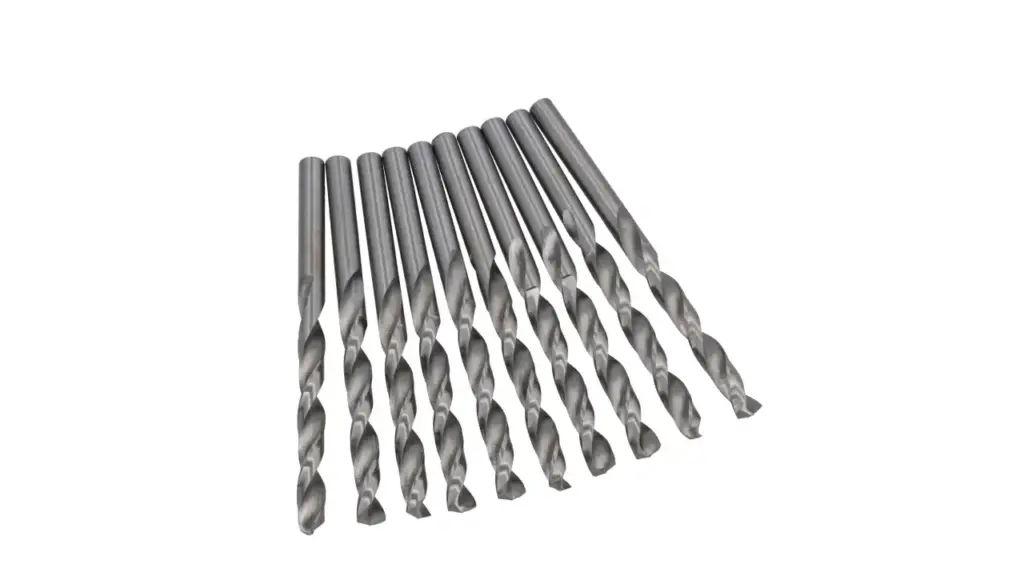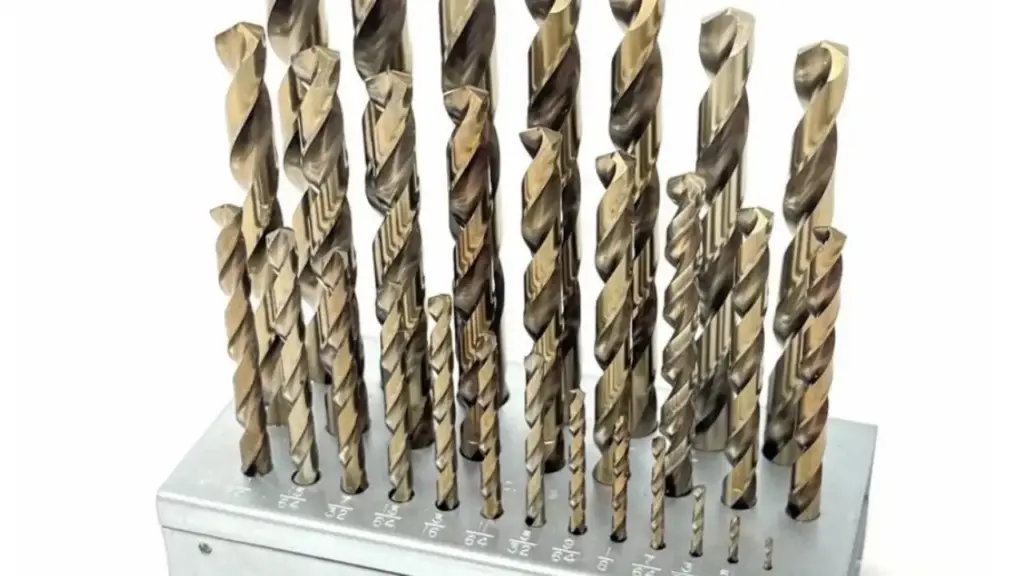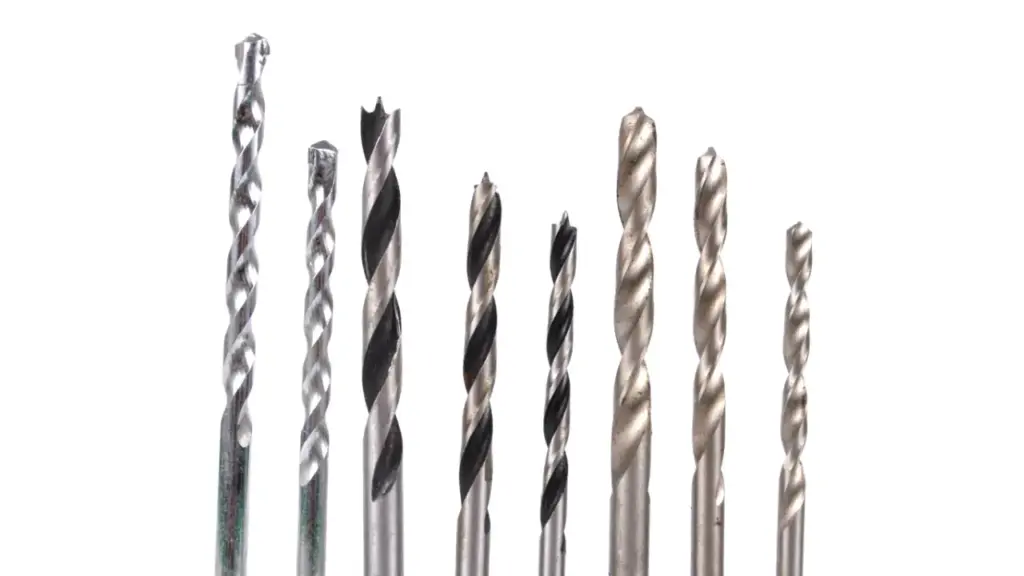Choosing the right drill bit is crucial for efficient metalworking. High-Speed Steel (HSS) and Cobalt drill bits are popular choices, but they differ significantly in composition and performance. HSS bits are versatile and cost-effective for softer metals, while Cobalt bits, with added cobalt, offer superior heat and wear resistance, excelling in harder materials like stainless steel.
Understanding these key differences is essential for selecting the optimal bit for your specific application. This blog will delve into the material properties, performance characteristics, ideal uses, and cost considerations of both HSS and Cobalt drill bits, empowering you to make an informed decision and achieve the best drilling results.
What are HSS Drill Bits

HSS (High-Speed Steel) drill bits are a common and versatile type of drill bit used for drilling holes in various materials, including softer metals like aluminum and mild steel, as well as wood and plastic.
They are manufactured from high-carbon steel that has been heat-treated to improve its hardness and resistance to wear, allowing them to cut effectively at higher speeds than standard carbon steel bits. While not as hard or heat-resistant as cobalt or carbide bits, HSS drill bits offer a good balance of performance and affordability for general-purpose drilling tasks. They are available in a wide range of types and sizes to suit different applications and drill chucks.
What Are HSS Drill Bits Used For?
HSS (High-Speed Steel) drill bits are versatile tools used for drilling holes in a wide range of materials due to their good balance of hardness, toughness, and affordability. They are commonly employed in various applications, from woodworking and general construction to metalworking on softer materials. While not ideal for extremely hard or abrasive materials, their ability to cut at higher speeds than carbon steel bits makes them a standard choice for many drilling tasks.
Here are some common applications of HSS drill bits:
- Drilling Wood: Suitable for creating holes for screws, dowels, and other joinery.
- Drilling Plastics: Effective for drilling various types of plastic and composite materials.
- Drilling Aluminum and Soft Metals: Well-suited for drilling holes in aluminum, copper, brass, and other softer non-ferrous metals.
- Drilling Mild Steel: Can be used for drilling thinner or softer grades of steel.
- General DIY and Home Improvement: A common choice for household drilling tasks.
- Pilot Holes: Often used to create pilot holes before using larger drill bits.
- Light-Duty Metalworking: Suitable for tasks where the metal is not excessively hard or thick.
What are Cobalt Drill Bits

Cobalt drill bits are a type of high-speed steel (HSS) drill bit that contains a percentage of cobalt (typically 5% or 8%) alloyed with the steel. This addition of cobalt significantly increases the bit’s hardness, heat resistance, and abrasion resistance compared to standard HSS bits.
As a result, cobalt drill bits excel at drilling through tough and abrasive materials such as stainless steel, hardened steel, cast iron, and titanium alloys, where standard HSS bits might quickly dull or fail due to excessive heat buildup.
While often more brittle and expensive than regular HSS bits, their enhanced durability and performance in demanding applications make them a worthwhile investment for professionals and those working with challenging materials.
What are Cobalt Drill Bits Used for?
Cobalt drill bits are specifically designed for drilling through tough and abrasive materials where standard HSS bits often fail prematurely. Their enhanced hardness and heat resistance, due to the addition of cobalt, make them ideal for working with materials that generate significant friction and heat during drilling. While they can technically drill softer materials, it’s generally not their primary application, and more cost-effective HSS bits are usually preferred for such tasks.
Here are common applications of cobalt drill bits:
- Drilling Stainless Steel: Their heat resistance allows them to effectively cut through this work-hardening material.
- Drilling Hardened Steel: Suitable for drilling through pre-hardened steel components.
- Drilling Cast Iron: The abrasion resistance handles the gritty nature of cast iron well.
- Drilling Titanium Alloys: Necessary for the high strength and heat-resistant properties of titanium.
- Drilling Inconel and Other High-Nickel Alloys: Used in aerospace and other industries for drilling these challenging superalloys.
- Working with Weld Seams: Can effectively drill through the hardened material of weld beads.
- Situations Requiring Higher Drilling Speeds: Their heat resistance allows for faster drilling in appropriate materials.
HSS Drill Bits vs Cobalt Drill Bits

Choosing the right drill bit is crucial for efficient and effective drilling. High-Speed Steel (HSS) and Cobalt drill bits are two popular options, each with distinct characteristics that make them suitable for different applications.
Understanding their differences in material composition, performance, cost, and ideal uses will help you make an informed decision for your drilling needs.
Material Composition
HSS drill bits are manufactured from high-carbon steel alloys that often include elements like molybdenum, tungsten, chromium, and vanadium to enhance their hardness and heat resistance compared to standard carbon steel bits.
These alloys allow HSS bits to maintain a reasonable cutting ability at higher speeds, making them a versatile choice for general-purpose drilling in softer materials. Various grades of HSS exist, each with slightly different alloy compositions to optimize specific properties like toughness or wear resistance for different applications.
Cobalt drill bits are a subset of HSS bits, but they contain an additional percentage of cobalt (typically 5% or 8%) in their alloy composition. This addition of cobalt significantly enhances the inherent properties of HSS.
The cobalt increases the bit’s hardness, heat resistance, and abrasion resistance, allowing it to maintain its cutting edge even when drilling through very hard and abrasive materials. This makes cobalt drill bits particularly effective in applications where significant heat buildup is common, such as drilling stainless steel or hardened alloys.
Performance and Durability
HSS drill bits offer a good balance of sharpness and durability for drilling softer materials like wood, plastic, aluminum, and mild steel. They can withstand moderate drilling speeds and feeds, making them suitable for a wide range of common tasks. However, when used on harder materials or at higher speeds and feeds without proper cooling, HSS bits can overheat quickly, leading to dulling of the cutting edge and reduced lifespan.
Cobalt drill bits exhibit superior performance and durability when drilling hard and abrasive materials like stainless steel, cast iron, titanium, and hardened steel. Their enhanced heat resistance allows them to maintain their sharpness at higher temperatures, reducing the risk of work hardening the material being drilled and extending the bit’s lifespan.
While more brittle than some HSS grades, their ability to effectively cut through challenging materials makes them a preferred choice for demanding applications where standard HSS bits would quickly fail.
Cost and Availability
HSS drill bits are generally more affordable and widely available than cobalt drill bits. Their lower cost makes them a practical choice for general-purpose drilling tasks and for users who may not frequently work with very hard materials. The extensive availability of HSS bits means they can be easily found in most hardware stores and online retailers in a wide variety of types, sizes, and sets.
Cobalt drill bits are typically more expensive due to the higher cost of cobalt and the specialized manufacturing processes involved.
While their initial cost is higher, their extended lifespan and ability to efficiently drill tough materials can make them more cost-effective in the long run for specific applications. Cobalt drill bits are generally found in professional-grade tool stores and online suppliers catering to machinists and metalworkers.
Ideal Applications
HSS drill bits are well-suited for a broad range of general-purpose drilling tasks in softer materials such as wood, plastic, aluminum, copper, brass, and mild steel. They are a cost-effective option for home DIY projects, woodworking, and basic metalworking where extreme hardness and heat resistance are not critical.
Cobalt drill bits are the ideal choice for drilling hard, abrasive, and high-tensile strength materials like stainless steel, hardened steel, cast iron, titanium alloys, and Inconel. They are commonly used in metalworking, machining, aerospace, and automotive industries where precision and the ability to cut through tough materials are essential, and where the extended lifespan justifies the higher cost.
| Feature | HSS Drill Bits | Cobalt Drill Bits |
| Material | High-carbon steel alloy (with elements like Mo, W, Cr, V) | HSS alloy with added Cobalt (5% or 8%) |
| Hardness | Good | Superior |
| Heat Resistance | Moderate | Excellent |
| Abrasion Resistance | Good | Excellent |
| Durability | Good for softer materials | Excellent for hard and abrasive materials |
| Cost | Lower | Higher |
| Availability | Widely available | Less common, typically in professional tool stores |
| Ideal Use | Wood, plastic, aluminum, mild steel, general purpose | Stainless steel, hardened steel, cast iron, titanium alloys |
How to Choose HSS Drill Bits and Cobalt Drill Bits
Selecting the right HSS or cobalt drill bit hinges on the material you intend to drill and the demands of the task. For softer materials like wood, plastic, aluminum, and mild steel, standard HSS bits offer a cost-effective and capable solution.
However, when tackling harder and more abrasive materials such as stainless steel, hardened steel, cast iron, or titanium alloys, the superior hardness and heat resistance of cobalt drill bits become essential for effective cutting and extended tool life.
Consider the material’s hardness, the potential for heat buildup during drilling, and the frequency of such demanding tasks to determine whether the added cost of cobalt bits is justified for your needs.
Here are key factors to consider when choosing between HSS and cobalt drill bits:
- Material Hardness: For softer materials, HSS is sufficient; for harder materials, cobalt is recommended.
- Heat Generation: If drilling is likely to generate significant heat (e.g., hard metals, high speeds), cobalt bits are more resistant to dulling.
- Frequency of Use on Hard Materials: If you frequently drill hard materials, the longevity of cobalt bits can be more cost-effective in the long run.
- Budget: HSS bits are generally more affordable for occasional or general-purpose use.
- Drill Speed and Feed Rate: Cobalt bits can often withstand higher speeds and feed rates when drilling tough materials.
- Coolant Use: While coolant can extend the life of both types, it’s particularly beneficial when using HSS on harder materials.
Are cobalt drill bits better than HSS?
Whether cobalt drill bits are “better” than HSS drill bits isn’t a straightforward yes or no, as it depends entirely on the application. Cobalt drill bits are a type of HSS bit with added cobalt, which significantly increases their hardness, heat resistance, and abrasion resistance.
This makes them superior for drilling very hard and abrasive materials like stainless steel, hardened steel, cast iron, and titanium alloys, where standard HSS bits would quickly dull or fail due to heat buildup.
However, for drilling softer materials such as wood, plastic, aluminum, and mild steel, standard HSS drill bits are often perfectly adequate and more cost-effective. HSS bits also tend to be more flexible and less brittle than cobalt bits, making them less prone to snapping in general-purpose use.
Therefore, the “better” bit depends on the specific drilling task and the material being worked on. Cobalt bits are a worthwhile investment when dealing with tough materials and high heat, while HSS bits are a more economical choice for everyday drilling.
Conclusion
While both HSS and cobalt drill bits are valuable tools, cobalt bits offer superior hardness and heat resistance, making them ideal for demanding applications involving hard metals. HSS bits are a more cost-effective choice for softer materials and general-purpose drilling. Understanding these key differences allows users to select the optimal bit for their specific needs, ensuring efficiency and longevity.
For those seeking high-quality wholesale drill bits, Sinodrills provides a comprehensive range of options. Their commitment to durable materials and precise engineering ensures reliable performance across various drilling tasks. Sourcing from Sinodrills can equip your business with dependable drill bits that meet the rigorous demands of professional use.
Choosing the right drill bit ultimately depends on the materials being worked with and the expected lifespan of the tool. While HSS serves well for many tasks, the enhanced capabilities of cobalt drill bits justify their investment for tougher materials and prolonged use. Consider Sinodrills for your wholesale needs to access a reliable supply of both HSS and potentially cobalt drill bits.


